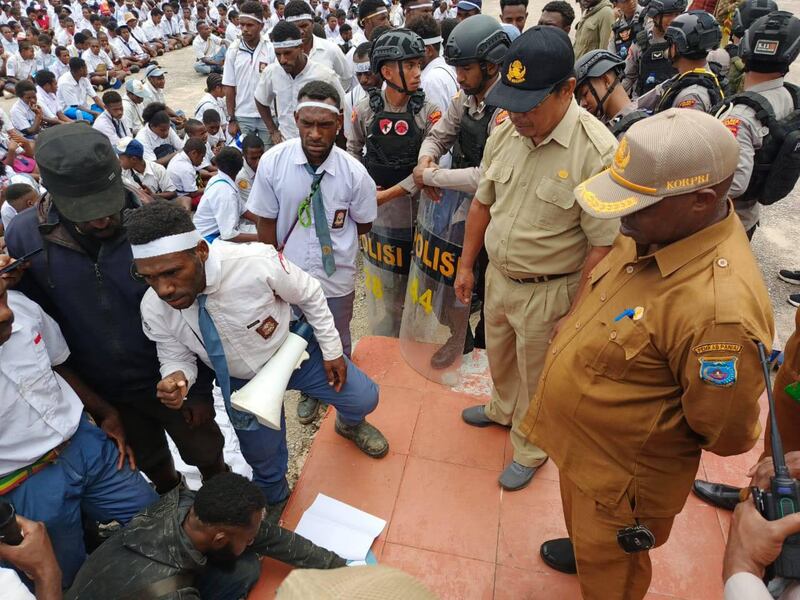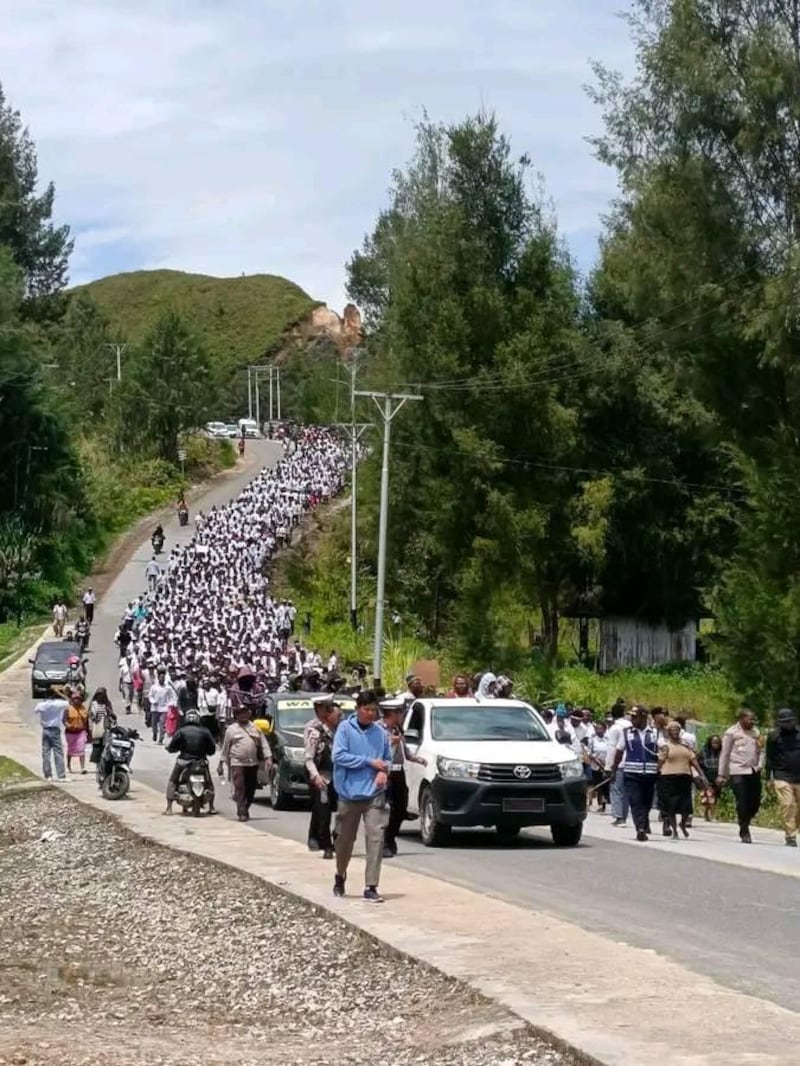More than 1,000 students in Indonesia’s restive Papua region took to the streets to protest a government-sponsored free-meal program, demanding that the government instead prioritize free education.
The demonstration on Monday in Enarotali, the capital of Paniai regency in Central Papua province, was the latest in a series of student-led protests across the region.
The students marched through the streets of Enarotali, carrying banners that read “We need free education, not free lunches” and “President Prabowo thinks more about filling stomachs than filling minds.”
The program is a flagship initiative of Indonesian President Prabowo Subianto, who took office in October. Known in Indonesian as Makan Bergizi Gratis (MBG), the Free Nutritious Meals program aims to address malnutrition and food insecurity, but critics argue it fails to address the root causes of poverty and inequality in Papua, where access to quality education remains a major challenge.
“Our parents already provide us with three meals a day,” said Alpius Tebai, coordinator of the Paniai Regency Student Alliance, which organized the protest. “Nature also provides for us. What we lack is access to education. We want the government to make education free.”
The demonstration in Enarotali was notably peaceful, with police providing security as students marched and delivered their demands.
During similar protests last week in other Papuan cities, authorities responded with force, including the use of tear gas and warning shots. In one incident in Nabire, a video circulated showing a local official kicking and verbally abusing a student.

Papua, Indonesia’s easternmost region that makes up the western half of New Guinea island, has been a flashpoint of tension since its controversial incorporation into the archipelago nation in 1969. Papua, home to a distinct Melanesian culture and vast natural resources, has seen a low-level separatist insurgency in the years since.
The Indonesian government has consistently rejected calls for Papua’s independence.
Experts said the student protests reflect dissatisfaction with Jakarta’s policies, which many Papuans view as paternalistic and disconnected from local needs.
Critics argue it overlooks the region’s deeper structural issues, including underfunded schools, a lack of qualified teachers, and high dropout rates.
Fabianus John Berek, a governance expert in Papua, criticized the free-meal program as a “centralized, top-down policy” that fails to consider the unique challenges faced by Papuan communities.
“The government’s approach reflects the centralized, authoritarian style of the New Order regime,” Berek wrote in an op-ed on Jubi, a Papua news website, referring to the 32-year rule of the late dictator Suharto.
“Such policies need to incorporate the diverse aspirations of Papuan communities, including students who are the primary beneficiaries,” he said. “An inclusive space for discussion and participation should have been established during the policy formulation stage of the MBG program.”
Berek called for greater involvement of local governments, educators, and community leaders in policymaking, particularly in a region with a history of marginalization and conflict like Papua.
Dadan Hindayana, head of the National Nutrition Agency (BGN), said the government respected those who chose not to participate in the program.
“This program is meant for school children, pregnant women and nursing mothers. If those eligible do not wish to receive it, we respect that,” Dadan told reporters on Monday.

Indonesian authorities have accused the West Papua National Committee (KNPB), a pro-independence group, of orchestrating the protests. Police in Jayapura claimed to have evidence that the KNPB provided materials and guidance to students, a charge the group denies.
"It's not new for the police to blame us for protests in Papua," said Warpo Wetipo, the KNPB's deputy chairman. "These students are intelligent and capable of organizing themselves. They don't need us to tell them what to do."
Human rights organizations have condemned the heavy-handed response to earlier protests. Amnesty International Indonesia called the use of tear gas and warning shots against students "excessive" and a violation of human rights.
The Legal Aid Institute of Papua (LBH Papua) has called for an investigation into the alleged abuses by security forces during the protests.
The organization urged Prabowo to reallocate funds from the lunch program to education and demanded accountability for officials involved in the violent crackdowns.
“Regarding free education, it is the obligation of the central government according to the constitution, [which states] every citizen has the right to education,” Emanuel Gobay, director of the Papua Legal Aid Institute, said in a statement.
“It is only right that all members of the security forces who tarnish the democratic space of Papuan students...are held legally accountable and arrested,” he said.
Jayapura-based reporter Victor Mambor is a co-founder and general manager of the Jubi news website, which is mentioned in this story.
